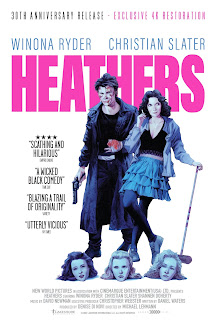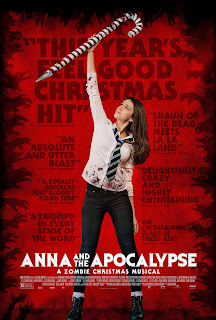Back to School Month: Heathers (Dir Michael Lehmann, 1h 43m, 1989)
The 1980s is arguably when the high school movie became an artform. We've already discussed the impact of John Hughes in producing some of the 1980s most enduring teen films in which school is either
a social proving ground, something to be endured, or a backdrop of the clash between expertly crafted social commentary and magical realism. But elsewhere, from Teen Wolf to Risky Business, this clean and All-American sense of teenager-hood, save for Hughes' Weird Science, the grittier, weirder and darker corners of the high school movie does, at points, glint through-this is without, of course, talking about the veritable cavalcade of slasher, fantasy
and science fiction movies in which the backdrop of high school is used as everything from a mere bookend to show the journey of the hero and how they have grown to a veritable metaphor to echo the violence and trauma of its
heroes.
And then there is Heathers, a pitch black comedy in which Winona Ryder's Veronica, part of a popular clique of girls (otherwise called Heather), finds herself embroiled
in bullying, social jockeying and an ever increasing body-count as her relationship with charming outsider, JD (Christian Slater), goes from friendly to an ever darker and more misanthropic relationship as she and JD attempt
to right the wrongs of the school's hierarchy, and Veronica begins to realise how dangerous her boyfriend has become. In its gloriously nasty, and often gleefully dark recreation of middle American school life, Heathers does not so much peek at the dark corners of school life as cheerfully rip back the covers and expose the viscera and blood and cruelty underneath,
The high school movie, perhaps
more than any other, reflects the teenager-hood of its protagonists, and through this, echoes the hopes and fears of the generation that see themselves reflected on the screen. If... reflects the burgeoning non-conformity of the newly born teenager, represented by Mick Travis, a product of the 1950s and 60’s against the backdrop of a year that saw teenagers of the period
take to the streets to protest and riot against the old order. Clueless, through Cher's eyes, is a portrayal of 90s materialism, of the MTV generation, of Generation X trying to make sense
of the world around them in the post Cold War period. Even the films of John Hughes represent the teenager of the Reagan era, as white, upper class and shallow, and openly materialistic, a surface-deep pack of brattish yuppies
spouting the American Dream of Freedom, the perfect girl, two and a half kids, and a good car and house.
Enter Heathers, a veritable switch-blade to the throat of Hughes' Brat Pack. There is, from the film's opening sequence, in which the three Heathers, (Duke, McNamara and Chandler (Shannen Doherty,
Lisanna Falk and Kim Walker, respectively) play croquet, leading to a surreal shot of Ryder buried up to her neck in the course, a gleeful nastiness to Heathers, from the Heathers out, as cruel people do brutally nasty things to each other. Where Hughes' protagonists are charmingly rebellious, Ryder's Veronica is a person pushed to the edge,
attempting to escape the clique of popularity in a knowing reversal of the typical High School Movie Plot, where popularity is everything and its heroes and heroines will stop at nothing to get to the top-Veronica will, eventually,
stop at nothing to get away from the top.
Following an introduction to the miscellaneous cliques of the film, and the Heathers using Veronica's skill with handwriting to forge a note from one of the popular
jocks to one of the least popular girls in school, the film introduces Slater's JD. JD is the single best thing about this film, a slowly unravelling performance that brings to mind the best of Jack Nicholson's performances
as he develops from charming if mysterious outsider to a positively malevolent and unhinged performance, full of malice, and eventually animal cunning as he plans to blow up the school. Whether it be screenwriter Daniel Waters'
attempt to get Stanley Kubrick(!) to direct the film-in what may have been the strangest and yet fitting entries into Kubrick's career, given the meta-textual references to both Full Metal Jacket in the cafeteria scene in which JD pulls a handgun on two jocks.
This, and the veritable pint-sized Jack Nicholson performance that Slater throws his all into, complete
with thousand yard stare comes to a perfect head in a dreamlike sequence in which Ryder and Slater practically, at least in the unnerving tone of the whole sequence, recreate the confrontation between Jack and Wendy Torrence
in the Overlook Hotel's ballroom. It is, without a doubt, the best single performance of Slater's entire career, in a joyfully nasty, misanthropic performance that at points, up till his confrontation with Veronica
and his comeuppance, threatens to steal the show. But the film is in no doubt that Veronica is, at least for stretches of the film both clearly in love with him and, at least at points, a willing participant in the miscellaneous
revenges that both wreak upon those who have wronged them, before she begins to understand, with the at turns bizarre and disturbing murder of two of the school's football team, what a monster she has created.
At
its heart, though, Heathers is a film about teenager-hood in the 1980s, about empty plaudits, about the football team being an asset to the school that makes its staff overlook crude rapacious
men, about the crushing expectation of social niceties, and the predatory, cruel social structures that places a few power-crazed cruel young men and women at the top. Other films bemoan this, make this a structure to rail
against. Some films make the deaths of supporting characters a major changing point in its protagonists, or forces the entire school body to reflect upon what it has become. For Heathers, it is a bump in the road. Even the bomb planted by, and the subsequent death of, JD himself is played largely for darkly comic laughs, as Veronica confronts and attacks her former boyfriend.
No teen movie before or since Heathers has been so wilfully playful with the deaths of its teenage cast.
At one point, after the blackly comic death of Heather Chandler, the film has several voiced over eulogies which pan from the sublime to the ridiculous, and practically beatifies this cruel, self-centred
young woman that Veronica still clearly cared about, whilst the deaths of two football players at the hands of JD and Veronica become a bizarre skewering of late 1980s America's relationship with gay men, with both eventually
becoming ammunition in the film's bleaky funny focus on teen suicide, including 80s (fictional) band, Big Fun's sublimely odd appearance and song "Teenage Suicide (Don't Do It)", a brutally nasty funny
take on 80s charity singles. Heathers does not so much approach its time-period with a scattergun approach as planting a bomb under the whole damn thing, from its sensibility and dress sense
to the school newspaper's muckraker approach and the deification of people who in life were respectively a nasty piece of work and a duo of knuckleheaded sexual predators.
But perhaps Heathers' unflinching dark satire of the school experience is the reason for its curious cinematic afterlife. Heathers, after all, flopped, its darkly funny sensibilities too much for America as it feasted on cinematic pap such as Big, Short Circuit and Twins over the summer of 1988. But, Heathers lives on, in the form of that fate of all 1980s cult classics, the musical (also the fate of Ryder's other role in 1988, Beetlejuice), including its appearance in equally dark and close-to-the-edge drama, Riverdale, a practical recreation of the 1980s teen flick writ large and spread
over the running time of a multi-season drama rather than a mere two hours.
Heathers lives on, simply, because more than any other teen movie of the 1980s, more than any teen movie.
More than Clueless's smartly slick 90s zeitgeist, more, even than the equally counter-cultural If... and certainly more than the fun, if fang-less anarchy of St Trinians, it snags and utterly obliterates its target. It is, like the bloody finale of If... a complete piece of wish-fulfilment, a film that digs deep into the underbelly of everything that sucked about being a teenager in school, its social niceties, the ubiquity of lunk-headed sportsmen who existed only to bring the school prestige at the cost of a personality, and popular women weaponising
their status to inflict cruelty and social put-downs upon their less popular peers, and stabs into its heart. It is gleefully, unapologetically nasty, and revels in it for every second, a shamelessly, darkly funny comedy about
revenge and what it wreaks, topped by two of the 1980s' best actors at the top of their games.
Rating: Must See (Personal Recommendation)



Comments
Post a Comment